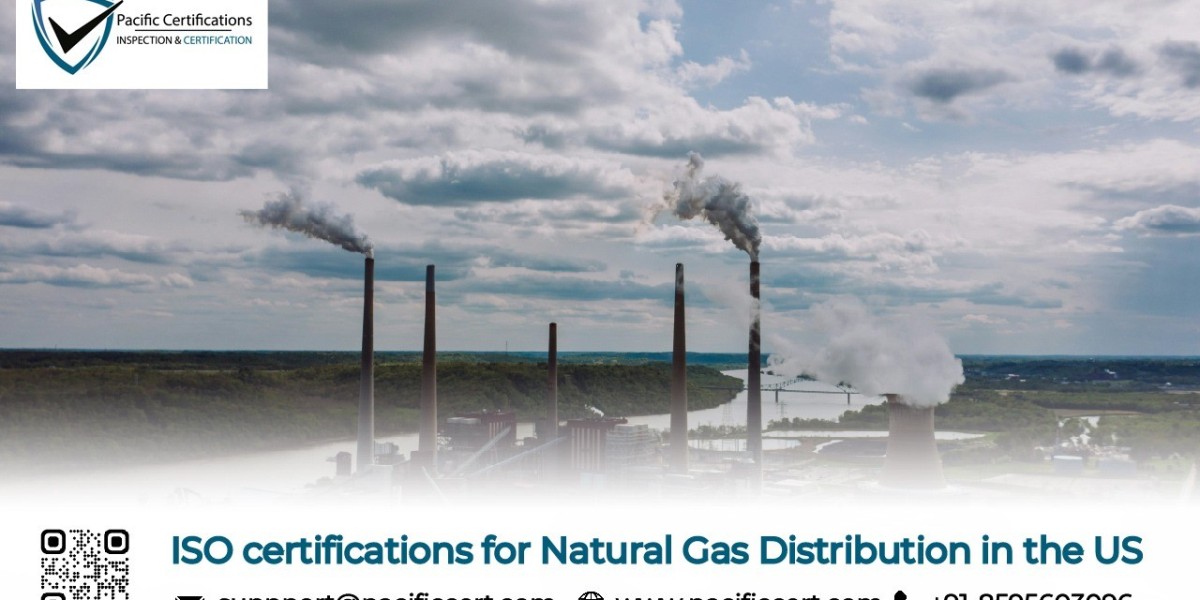Natural gas is one of the most important energy sources in the United States, providing fuel for electricity generation, heating, and various industrial processes.
The distribution of natural gas from production sites to end users is a complex process, and ensuring the safety and reliability of this distribution system is critical. To maintain high standards of performance, organizations in the natural gas distribution sector seek ISO certifications that align with international best practices.
This blog will explore the key ISO standards applicable to natural gas distribution companies in the U.S., the requirements for achieving certification, the benefits of obtaining ISO certification, and how Pacific Certifications can assist organizations with audit and certification.
Applicable ISO Standards for Natural Gas Distribution companies
Several ISO standards are relevant to natural gas distribution, each addressing different aspects of quality, safety and energy efficiency. The most applicable ISO standards for companies involved in natural gas distribution include:
ISO 9001:2015 – Quality Management Systems
ISO 9001 is the internationally recognized standard for quality management systems (QMS). For natural gas distribution companies, ISO 9001 certification ensures that the organization has implemented effective processes to maintain the quality of its services and customer satisfaction.
ISO 14001:2015 – Environmental Management Systems
ISO 14001 provides a framework for organizations to manage their environmental responsibilities. Natural gas distribution companies must adhere to strict environmental regulations and ensure that their operations do not negatively impact the environment.
ISO 45001:2018 – Occupational Health and Safety Management Systems
ISO 45001 provides guidelines for establishing a robust occupational health and safety management system. The certification focuses on preventing workplace accidents, ensuring employee safety, and complying with safety regulations.
ISO 50001:2018 – Energy Management Systems
ISO 50001 helps organizations improve their energy performance by implementing an energy management system (EnMS). Natural gas distribution companies can benefit from ISO 50001 certification by optimizing their energy usage, reducing energy consumption, and minimizing associated costs.
ISO 27001:2022 – Information Security Management Systems
ISO 27001 provides a framework for establishing an information security management system (ISMS) to protect sensitive data and ensure the confidentiality, integrity, and availability of information. Certification to ISO 27001 helps companies protect their data from cybersecurity threats, which is crucial in an era of rising cyber-attacks on critical infrastructure.
ISO 22301:2019 – Business Continuity Management Systems
ISO 22301 provides a framework for managing business continuity and ensuring that operations can continue in the event of an unexpected disruption. This is particularly important in the natural gas sector, where interruptions can have significant safety, economic, and social consequences.
ISO/TS 29001:2020 – Quality Management Systems for the Petroleum, Petrochemical, and Natural Gas Industries
ISO/TS 29001 is a sector-specific standard for quality management systems in the petroleum, petrochemical, and natural gas industries. It builds upon the requirements of ISO 9001 but includes additional requirements specific to the oil and gas sector. This standard helps natural gas distribution companies ensure the reliability of their systems, reduce operational risks, and improve the safety of their infrastructure.
Click here to find out more applicable standards to your industry
Requirements for ISO Certification in Natural Gas Distribution Industry
To achieve ISO certification, natural gas distribution companies must meet the specific requirements outlined in the applicable ISO standards. Below are common elements that organizations must address across all certifications:
Establish a Management System
Organizations seeking ISO certification must implement a management system that aligns with the requirements of the specific ISO standard.
Conduct a Gap Analysis
Before pursuing ISO certification, companies must assess their current operations against the requirements of the standard.
Employee Training and Awareness
Employees must be trained on the management system and understand their roles and responsibilities in maintaining compliance with ISO standards.
Risk Management
Risk management is a critical component of most ISO standards. Organizations must identify potential risks related to their operations and implement controls to mitigate these risks.
Continuous Improvement
ISO standards emphasize the need for continuous improvement. Organizations must establish a process for monitoring and evaluating the performance of their management systems and implement corrective actions when necessary.
Internal Audits and Management Reviews
Internal audits are a key requirement for ISO certification. Organizations must conduct regular audits of their management systems to ensure compliance with the standard’s requirements.
Certification Audit by a Third-Party Certification Body
Once the organization has implemented the management system and addressed any gaps, it can apply for certification. A third-party certification body, will conduct an external audit to assess the organization’s compliance with the ISO standard. If the audit is successful, the organization will be awarded the certification.
Benefits of ISO Certification for Natural Gas Distribution Businesses
Obtaining ISO certification provides numerous benefits to natural gas distribution companies. These benefits enhance the company’s operational efficiency.
- ISO certifications like ISO 45001 help ensure that natural gas distribution companies have robust safety protocols in place, reducing the risk of workplace accidents.
- ISO certifications demonstrate that an organization complies with relevant industry regulations and standards.
- ISO certifications promote the implementation of efficient processes and systems that streamline operations, reduce waste, and optimize resource utilization.
- Through the risk management requirements of ISO standards, natural gas distribution companies can proactively identify and mitigate potential risks.
- ISO certifications provide assurance to customers, partners, and stakeholders that the company adheres to high standards of quality, safety, and environmental responsibility.
- ISO 14001 certification helps natural gas distribution companies minimize their environmental impact by implementing sustainable practices.
- ISO 50001 certification enables organizations to optimize their energy usage, reduce consumption, and lower energy-related costs.
How Pacific Certifications Can Help
At Pacific Certifications, we specialize in providing audit and certification services for a wide range of ISO standards. As a trusted and accredited certification body, we can help natural gas distribution companies in the U.S. achieve certification to ISO 9001, ISO 14001, ISO 45001 and other relevant standards.
Our role is to conduct thorough audits of your management systems to ensure compliance with the requirements of the ISO standards. Once your organization meets the necessary criteria, we issue the certification, demonstrating your commitment to excellence, safety, and sustainability. It is important to note that we do not provide training, implementation, consultancy, or gap analysis services, our focus is solely on auditing and certification.
Our Certification Process
- Application: Your organization submits an application for the desired ISO certification.
- Pre-Audit: We may conduct a pre-audit to help identify any potential gaps, though this step is optional.
- Stage 1 Audit: We review your management system documentation to ensure it aligns with the ISO standard’s requirements.
- Stage 2 Audit: We perform an online/on-site audit to assess the implementation and effectiveness of your management system.
- Certification Decision: If your organization meets the requirements, we issue the ISO certification.
- Surveillance Audits: Periodic surveillance audits are conducted to ensure continued compliance with the ISO standard.
By partnering with us, natural gas distribution companies can achieve the ISO certifications needed to enhance their safety and sustainability. Our audits provide the independent verification required to ensure that your management systems meet international standards, helping you maintain compliance and drive continual improvement.
Pacific Certifications is accredited by ABIS, in case you need support with ISO certification for your Natural Gas Distribution business in the US, please contact us at support@pacificcert.com or +91-8595603096.



